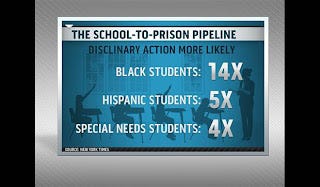“Keeping Kids in School and Out of Court” report

According to the “Keeping Kids in School and Out of Court” report, there were 69,643 suspensions and 882 arrests during the 2012 school year— over with over half of them for students of color and disability.
The study noted that there was a direct relation between the disciplinary measures and students’ future educational careers. Those who received “discretionary” summons—for low-level disciplinary behavior—were four times more likely to drop out of school.
“School outcomes and justice outcomes are intertwined, “said Kathleen DeCataldo, Executive Director of the New York State Permanent Judicial Commission on Justice for Children, who presented the report’s research findings.
DeCataldo cited a 2011 study, Breaking Schools’ Rules, which followed almost one million Texan students for five- years, and found that students suspended or expelled were three times as likely to be in contact with justice system the following year.
In New York, where data detailing school suspensions and school-related summonses only became publicly available in 2011, black students were the most affected. They representing 28 percent of the student population, but had almost 63 percent of the arrests and half of the suspensions.
“We have come to expect these type of results, but don’t have to accept these results,” said Damon Hewitt, Director of the Education Project of the NAACP Legal Defense Fund, and a member of the Task Force.
The 44-member Task Force met with a broad cross-section section of New York school administrators, teachers, social service agencies, judges and prosecutors---as well as experts from other cities.
“New York City should really be at the forefront of dealing with this issue,” said Joan Gabbidon, senior deputy district attorney for Kings County, New York.
Report:
http://www.advocatesforchildren.org/sites/default/files/library/sjptf_report.pdf?pt=1
Thousands of Massachusetts students tossed out of school for minor offenses:
Massachusetts logged more than 75,000 in-school and out-of school suspensions in the 2010-2011 school year, a study of state education data by the New England Center for Investigative Journalism has found. Details on the particulars of those suspensions is not yet available, but they do account for thousands of days of lost classroom time for students, many of whom are in danger of dropping out of school, critics say.
Topping the list was Springfield, with more than 3,000 out-of-school suspensions during the 2010-2011 school year. Boston, Lynn, Worcester and Brockton follow, each with more than 2,000. Holyoke, Fall River, Lawrence, Lowell and New Bedford each marked more than 1,000 out-of-school suspensions during the same time period.
For many observers, the numbers which raise more concern are those which reflect how much class time is lost for students punished for minor infractions.
Statewide, students facing minor offenses lost nearly 54,000 days of classroom time during 2009-2010, the most recent year for which such detailed data about the infractions is available. The number of days lost for minor offenses exceeded the number of days lost by students charged with gun, alcohol, knife and explosive possession, sexual assault, theft and vandalism combined, the data shows.
Minor offenses are classified as “unassigned,” a term used by state education officials to cover non-violent and non-criminal misdeeds, such as talking back to a teacher, swearing or truancy.
Once removed from school, many of those youngsters fall behind in their studies, primarily because a majority of students involved in serious discipline cases get no educational services once tossed from the classroom, says Nakisha Lewis, a project manager with the Schott Foundation for Public Education. The Schott Foundation is a Cambridge-based group which advocates for more equitable distribution of educational resources.
“We’re creating what many people are calling ‘dropout factories,’” noted Lewis, who has helped the Schott Foundation spearhead several studies, including one which found that students who are suspended or expelled often drop out of school, leading to juvenile delinquency, arrests and, eventually, prison. Taking kids out of class for non-violent offenses, Lewis explained, is akin to creating a cradle-to-prison pipeline.
“It doesn’t take a leap of imagination to know that if you take children with problems and throw them onto the street with little or no education, we’re going to breed a society of criminals,” said attorney Sam Schoenfeld, of Canton, who has represented a number of expelled and suspended students. “What needs to be done is to stop this chain of events.”
http://necir-bu.org/investigations/suspended/


